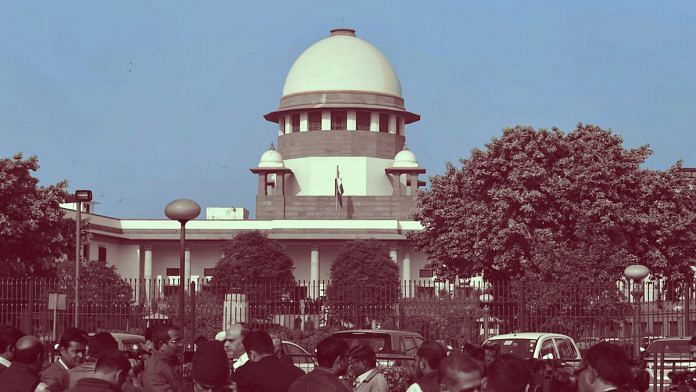Reforming India’s criminal justice system needs more innovation than forcing prosecutors to perform or perish.
To fix India’s dysfunctional criminal justice system, state governments are prescribing a dangerous quack remedy – incentivising public prosecutors to put people behind bars and ensure maximum punishment for them.
Two state governments – Maharashtra and Madhya Pradesh – have devised a “reward system” for public prosecutors to make sure they have a high rate of conviction. Low conviction rate is a problem that plagues most states so it is only a matter of time before other states make similar moves.
The move not only encourages wrongful convictions but also risks the right to a fair trial, a fundamental right of a citizen.
Also read: Hashimpura verdict exposes India’s criminal justice system
The projects
In 2015, Devendra Fadnavis-led Maharashtra government brought in many new measures to tackle its low conviction rate even as the state and central government cannot agree on what the conviction rate in the state really is.
Apart from making conviction rate a parameter in annual confidential reports (ACR) of prosecutors, the government announced that prosecutors with less than 25 per cent convictions will be dropped after two years.
Subsequently, it also brought in a notification making it mandatory for assistant public prosecutors to show at least 25 per cent conviction rate to be eligible for promotions.
In a judgment that was made public last week, the Bombay High Court has quashed the notification that puts a minimum rate of conviction as a criteria for promotion. Interestingly, the challenge against the government notification was made by the Maharashtra State Public Prosecutors Association.
However, the criterion remains in ACRs, which is likely to have an overall impact on their careers.
This year, the Madhya Pradesh government devised an app, which tracks prosecutors’ performance. Based on this, there is a “reward system” to “motivate” prosecutors to ensure speedy trials and quick convictions.
The MP scheme is worse than Maharashtra’s because the reward is not based on convictions secured but on the quantum of punishment sought – 1,000 points for a death sentence, 500 for a life term, 100-200 points for maximum punishment in lower courts. The prosecutors get tags like “best prosecutor of the month” and “pride of prosecution” for collecting 2,000 points, and those who end up with less than 500 points get a “strict warning”. The ‘MPProsecution’ app can be downloaded from Google Play Store and claims to track 1,000 government prosecutors across the state and generate a performance report.
Corresponding with the real-time tracking of the prosecutor through an app is the high rate of capital punishments being doled out in MP courts.
Also read: How the Supreme Court took it upon itself to become a daily criminal investigation monitor
Problem with the plan
The obvious danger in rewarding prosecutors for wrongful convictions is that it encourages them to make false submissions even at the cost of risking the fairness of the trial.
Ujjwal Nikam, the famous prosecutor, had proudly confessed that he concocted a statement that Ajmal Kasab, the lone LeT terrorist to be captured alive after the 26/11 attacks, had asked for biryani while in prison to create a bias against him. While the lie may have not secured Kasab’s conviction and death sentence, it is proof of how dangerously far prosecutors may go.
Another flaw in evaluating prosecutors based on convictions is that many of their ‘successes’ could just be reversed in higher courts. Higher courts routinely find glaring errors in judgments of trial courts.
Government lawyers at appellate stages – in high courts and Supreme Court – change and the prosecutor who secured a conviction initially will reap benefits even if the ruling is subsequently thrashed.
Role of a prosecutor
Public prosecutors, who are appointed by the state governments, are more than just a cog in wheel. Multiple Supreme Court rulings and Law Commission reports in 1958 and 2006 have emphasised on the independence and the impartiality of a public prosecutor. The law requires the prosecutor to act independently as an officer of the court and not on behalf of the investigative agency.
It would be disastrous if public prosecutors begin to assure the state that s/he would secure the conviction in any case. The reasons for low convictions have little to do with prosecutors, who come in once the trial begins. It is the police’s investigation, evidence-gathering mechanisms that ensure convictions.
Also read: The problem with the instant justice courts of Madhya Pradesh
The political push in showing quick results is also hard to miss. While Prime Minister Narendra Modi mentions an instant death sentence within five days of trial as a proud achievement in his Independence Day speech, chief minister Shivraj Singh Chouhan has felicitated prosecutors who ensured death sentences.
Reforming India’s criminal justice system needs more innovation than forcing prosecutors to perform or perish. Encouraging prosecutors to get more death sentences is the surest way to ensure the death of our criminal justice system.




Biryani sounds like a particularly virulent dog whistle.